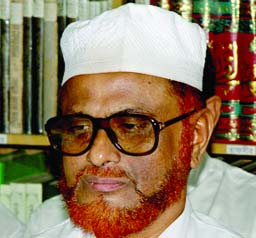
UNB, Dhaka :
The International Crimes Tribunal-1 on Thursday kept pending its verdict to be delivered any day after closing arguments in the trial of the war crimes allegedly perpetrated by ATM Azharul Islam as commander of Al Badr, a vigilante unit of Jamaat-e-Islami in 1971.
Hearing the law point arguments from both the prosecution and the defence lawyers, tribunal chairman Justice M Enayetur Rahim, flanked by its two other members Justice Jahangir Hossain and Justice Anwarul Haque, passed the order.
With the day’s ICT-1 order, four cases hang around for judgment that include Jamaat-e-Islami ameer Motiur Rahman Nizami, local BNP leader and Nagarkanda Municipality mayor Zahid Hossain Khokon and local Awami League (expelled ) leader in Akhaura, Brahmanbaria, Mobarak Hossain.
Rebutting the defence law point arguments, prosecutor Dr Tureen Afroz sticking to her guns pleaded for compensation to Birangana Mansura Khatun, a Liberation War victim, in sentencing the accused to death penalty as the International Crimes (Tribunals) Act, 1973 provides wide discretionary powers to the tribunal since the Act is protected under the constitution.
Referring to the ICT Act, Tureen said the tribunal may regulate its own procedure subject to the provision of the Act.
The provision under the ICT Act sentencing the accused is not ambiguous because ambiguity and the power of discretion of the tribunal do not trigger the same issue, she argued.
About the hearsay evidence as opposed by the defence, Tureen, citing settled jurisprudence of international law, submitted that there is no need to corroborate hearsay evidence with any direct evidence. She said once admitted, the hearsay evidence can stand on its own to prove offence against an accused.
Even anonymous hearsay evidence can be used to corroborate other evidence, argued Tureen, saying that recent decision saying that even anonymous hearsay evidence alone is sufficient to prove a material fact.
About the charge of Joint Criminal Enterprise (JCE) made against the accused Jamaat leader, the prosecutor submitted that JCE has been an established doctrine since time immemorial in the context of mass atrocities. JCE is not a crime; it’s a liability for crime which the defence has completely failed to realise.
The prosecutor dismissed the defence claim that the JCE doctrine prejudices the accused as it mostly means ‘Just Convict Everyone’ (JCE) involved in the crime.
Before concluding, prosecutor Tureen further pleaded for awarding compensation to the Birangana, also wife of a freedom fighter, in sentencing the accused death penalty as the prosecution has been able to prove all the six charges beyond reasonable doubt.
On November 12, 2013, the tribunal framed charges against ATM Azharul Islam for his involvement in crimes against humanity, including genocide, during the Liberation War in collaboration with the Pakistan occupation army, dismissing his discharge plea.
Also assistant secretary general of Jamaat-e-Islami, Azharul faces six counts of charges of crimes against humanity during the 1971 Liberation War like killing, abduction, confinement, torture, loot, arson, rape and genocide in Rangpur district.
A week after submitting the formal charge by the prosecution, the tribunal on July 25, 2013 took cognisance of the charge against Azharul as it found a strong prima facie case against the accused under subsections 3(2) and 4(1) (2) of the International Crimes (Tribunals) Act 1973.
According to the prosecution case, Azharul had been involved in the killing of more than 1,200 unarmed innocent civilians in Rangpur during the Liberation War in collaboration with the Pakistan occupation army.
It mentioned that Azharul Islam had played a key role in the killing of intellectuals, cultural personalities, physicians and lawyers in different areas of Rangpur during the 1971 war.
On August 22, 2012, police arrested Azharul from his Moghbazar house in the capital in connection with the war crimes case, after the tribunal issued a warrant for his arrest upon a prosecution plea.

